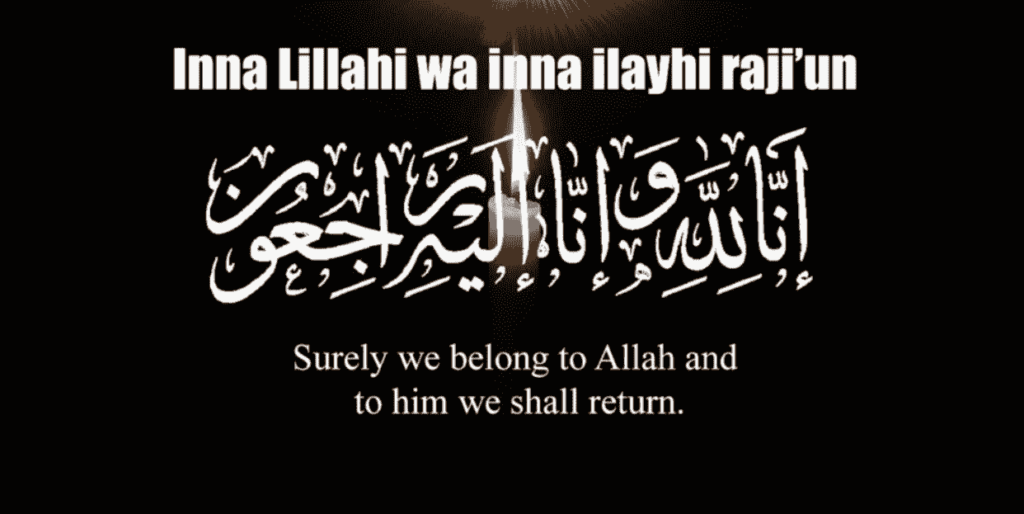Islamic Condolences Dua, Islamic Condolences Message
In times of sorrow or calamity, we often say ‘Inna lillahi wa inna ilayhi rajiun’ (إِنَّا لِلَّهِ وَإِنَّ إِلَيْهِ رَاجِعُونَ), seeking solace and understanding.

What is an Islamic condolence message?
An Islamic condolence message is a way to express condolences to someone who has lost a loved one in accordance with the teachings of Islam. It is a way to comfort and console a grieving person, while also offering prayers for the deceased and their eternal peace.
Expressing condolences in Islam
In Islam, expressing condolences is an important practice. Muslims are encouraged to extend their sympathies to those who have lost a loved one and offer their support and prayers. It is a way to show compassion and offer solace during difficult times.
How to console a grieving person?
Console a grieving person by being present for them, listening to their feelings, and offering them emotional support. It is important to be understanding, patient, and empathetic towards their pain and loss. A kind word, a hug, or a sincere condolence message can go a long way in providing comfort during such times.
Islamic way to comfort a loved one
The Islamic way to comfort a loved one is to offer them sincere condolences, remind them of Allah’s mercy, and encourage them to have faith and patience. It is also important to aid them in fulfilling their religious obligations and provide practical support, such as helping with funeral arrangements or offering assistance in daily chores.
How to offer condolences to a Muslim friend?
When offering condolences to a Muslim friend, it is important to show sensitivity and understanding to their religious beliefs and customs. Here are some ways to offer condolences:
Islamic dua for someone who has passed away
One of the ways to offer condolences is to recite the Islamic dua for someone who has passed away. The dua is a supplication to Allah, asking for His mercy and forgiveness for the deceased. It is a way to pray for their soul and ask for their eternal peace.
Etiquette for comforting a grieving Muslim friend
When comforting a grieving Muslim friend, it is important to respect their grief and offer support while adhering to Islamic customs. This includes avoiding extravagant expressions of grief, refraining from questioning Allah’s decree, and offering words of comfort and encouragement rooted in Islamic teachings.
What to say when someone dies in Islam?
In Islam, when someone dies, it is common to say “Inna lillahi wa inna ilayhi raji’un,” which translates to “Surely, we belong to Allah and to Him, we shall return.” This phrase acknowledges that all life and death are in the hands of Allah and reminds us of the temporary nature of this world.
Importance of dua in Islamic condolences
Dua holds great importance in Islamic condolences. Through prayer, Muslims seek Allah’s blessings and mercy for the deceased and ask for strength and patience for their loved ones left behind. See Also: Naye Saal Ki Dua
Saying dua for the deceased
Saying dua for the deceased is a way to seek forgiveness for them, ask for their entry into paradise, and pray for their soul to rest in peace. It is a way to remember and honor the departed and seek Allah’s mercy and blessings upon them.
May Allah give patience to the bereaved
When offering condolences, it is important to pray for Allah to give patience to the bereaved. Losing a loved one is a difficult and painful experience, and seeking Allah’s support and comfort can provide solace and strength during such times.
May the deceased rest in peace
It is customary to pray for the deceased to rest in peace. Muslims believe that the soul continues its journey after death, and through prayers, they seek Allah’s mercy and blessings for the departed to find eternal peace in the afterlife.
Islamic beliefs about death and the afterlife
In Islam, death is seen as a natural part of life and a transition to the eternal afterlife. Here are some Islamic beliefs about death:
Concept of inna lillahi wa inna ilayhi raji’un
The phrase “Inna lillahi wa inna ilayhi raji’un” reminds Muslims that they belong to Allah and that they will eventually return to Him. It serves as a source of comfort and a reminder of the transient nature of this world.
Islamic understanding of death
In Islam, death is not the end but a transition to the hereafter. Muslims believe in the existence of a soul and that it continues its journey after death. Death is seen as a test and an opportunity for the soul to be reunited with Allah in the eternal realm.
Jannatul Firdaus: The highest level of Paradise
Jannatul Firdaus is believed to be the highest level of Paradise in Islam. It is described as a place of ultimate bliss and joy, where the righteous are rewarded for their faith and good deeds. Muslims aspire to attain Jannatul Firdaus for themselves and their loved ones.
Islamic condolences messages in English
When offering condolences in English, it is important to use words that convey empathy, support, and prayers. Here are some sample Islamic condolences messages:
Sample condolence messages from Quran and Hadith
1. “May Allah bless and forgive the departed soul, and may He grant you and your family the strength and patience to bear this loss. Our thoughts and prayers are with you.”
2. “In this time of sorrow, we offer our deepest condolences. May Allah grant the deceased eternal peace and give you the comfort and solace you seek.”
Praying for the deceased in Islamic condolences
Praying for the deceased is an integral part of Islamic condolences. Muslims offer sincere prayers to Allah, asking for His mercy, forgiveness, and blessings for the departed soul. It is a way to show love and respect for the deceased and offer support to their grieving loved ones.
May Allah bless and forgive the departed soul
When offering condolences, it is customary to pray for Allah to bless and forgive the departed soul. Muslims believe in the infinite mercy of Allah and seek His forgiveness and mercy for the deceased, hoping for their ultimate salvation in the afterlife.


